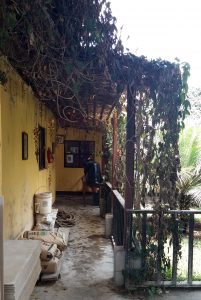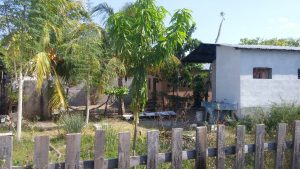
Perception Across Continents
When I got on the plane to Guatemala, I felt like I had a good idea of what to expect. I had been traveling in Latin and South America for years, from getting to go with my dad on a business trip to Santiago, to academic exchange in Guadalajara, to two months of community service essentially alone in a rural community in the Dominican Republic. But traveling for research was different, and left me with different insights.
When we first arrived in Antigua, I was almost disappointed at how comfortable I felt. In a beautiful hotel in a safe city surrounded by friends from home, this wasn’t the immersion experience I had had in the past. But things quickly heated up. We toured the sites of several sustainability-related operations, and dug into them in discussion afterwards. The most poignant of these was our tour of a facility providing daycare, medical care, and student support as part of the group’s mission to get youth through high school. The property was beautiful, full of shady spaces to study and play surrounded by lush plants and green grass. But as we listened, some of the methods the group used began to raise our suspicions. Many Guatemalan youth drop out of school early or never start because they are needed to bring money into the family, let alone affording the cost of school. In rural areas, this organization provides bags of food to families who send their children to school and goes so far as to construct schools in needy areas. As an American Indian Studies minor, this all sounded very familiar. Realizing that these children and young adults were being forced into the Western educational system possibly at the expense of their native culture and values, just this had happened to American Indians, was heartbreaking.
 Once I came back to the United States, that experience stayed in the front of my mind. It’s easy to say “values are subjective” and “all I know is that I know nothing,” but actually coming to understand what that means shook me. The charity we had visited had the best intentions in mind, and was succeeding in getting students through school and into better paying jobs in the city. But who are a bunch of outsiders to say that that’s what is best for those kids? How do we account for the intangible value of farming the same land as your grandfather and learning traditional textile arts to make huipil skirts for your sisters? Western ideas of progress—making money, moving into city houses, buying lots of factory-made goods, buying into the system and following the rules to make more money and get further “ahead”—are not universally helpful, and often exclude social and cultural advantages. This realization was an absolute paradigm shift in my mind. Everything I do is through different eyes. I find myself constantly analyzing concepts of beauty, social norms, and especially progress and wondering how much of my life is the way I want it to be and how much feels right because that’s what Western society tells me should be true. It isn’t comfortable and it isn’t easy, but it is a challenge that allows me to assess my life and my experiences on a deeper and perhaps more genuine level.
Once I came back to the United States, that experience stayed in the front of my mind. It’s easy to say “values are subjective” and “all I know is that I know nothing,” but actually coming to understand what that means shook me. The charity we had visited had the best intentions in mind, and was succeeding in getting students through school and into better paying jobs in the city. But who are a bunch of outsiders to say that that’s what is best for those kids? How do we account for the intangible value of farming the same land as your grandfather and learning traditional textile arts to make huipil skirts for your sisters? Western ideas of progress—making money, moving into city houses, buying lots of factory-made goods, buying into the system and following the rules to make more money and get further “ahead”—are not universally helpful, and often exclude social and cultural advantages. This realization was an absolute paradigm shift in my mind. Everything I do is through different eyes. I find myself constantly analyzing concepts of beauty, social norms, and especially progress and wondering how much of my life is the way I want it to be and how much feels right because that’s what Western society tells me should be true. It isn’t comfortable and it isn’t easy, but it is a challenge that allows me to assess my life and my experiences on a deeper and perhaps more genuine level.
 On this trip, I had running water and consistent electricity, I didn’t have to write papers in Spanish, and I didn’t get lost in a busy city looking for an office building I’d never seen before. But watching colonialism in action and realizing how profoundly these assumptions I never knew I was making might be affecting my world shocked me much more than any of those challenges. My perspective as a student and a citizen is forever changed, and I truly believe that as a result of this experience, my contributions to sustainability will be shaped by deeper questioning of my experiences and perceptions.
On this trip, I had running water and consistent electricity, I didn’t have to write papers in Spanish, and I didn’t get lost in a busy city looking for an office building I’d never seen before. But watching colonialism in action and realizing how profoundly these assumptions I never knew I was making might be affecting my world shocked me much more than any of those challenges. My perspective as a student and a citizen is forever changed, and I truly believe that as a result of this experience, my contributions to sustainability will be shaped by deeper questioning of my experiences and perceptions.

